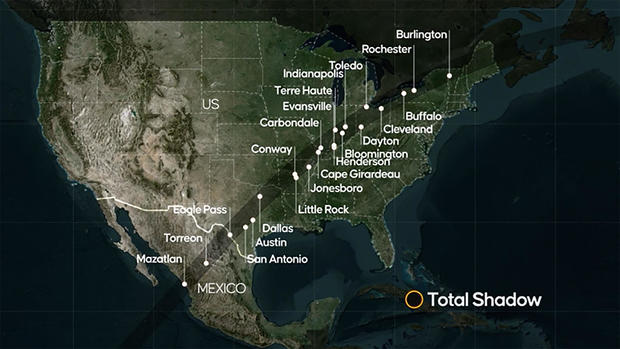
How often total solar eclipses happen — and why today’s event is so rare
On April 8, a rare total solar eclipse will create a “path of totality” over North America, throwing swaths of the United States, Canada and Mexico into darkness in the middle of the day.
A solar eclipse occurs when the moon passes between the Earth and the sun, blocking our view of the sun as it passes. It’s called a total solar eclipse when the moon completely blocks the light of the sun. These events are rare, and can only be viewed in specific areas for short periods of time.
The path of totality for the 2024 total solar eclipse will arc from Texas to the East Coast. Cities including Dallas, Texas; Buffalo, New York; and Burlington, Vermont, will be among the areas with the best views — if the weather is clear.
NASA/Getty Images
How often do total solar eclipses happen?
Total solar eclipses are rare, and ones that are visible from the United States are even rarer.
NASA said.
Best places to view the total solar eclipse in April
04:04
When was the last total solar eclipse?
The last total solar eclipse was in 2021 and was only visible from Antarctica. The period of totality lasted just one minute and 54 seconds, according to NOAA.
The last total solar eclipse visible from North America was in 2017. Parts of the United States from Oregon to South Carolina were able to witness the rare phenomenon. Prior to that, the last total solar eclipse visible in the United States since 1979, when just five states were in the path of totality.
When will the next total solar eclipse be?
The next total solar eclipse will be on Aug. 12, 2026, according to NOAA. This eclipse will be viewable from the Arctic, eastern Greenland, northern Spain and Iceland.
Those looking to see a total solar eclipse in the United States will have to wait significantly longer. A total solar eclipse won’t occur in the contiguous U.S. until August 2044.
More
More
Source: cbsnews.com
